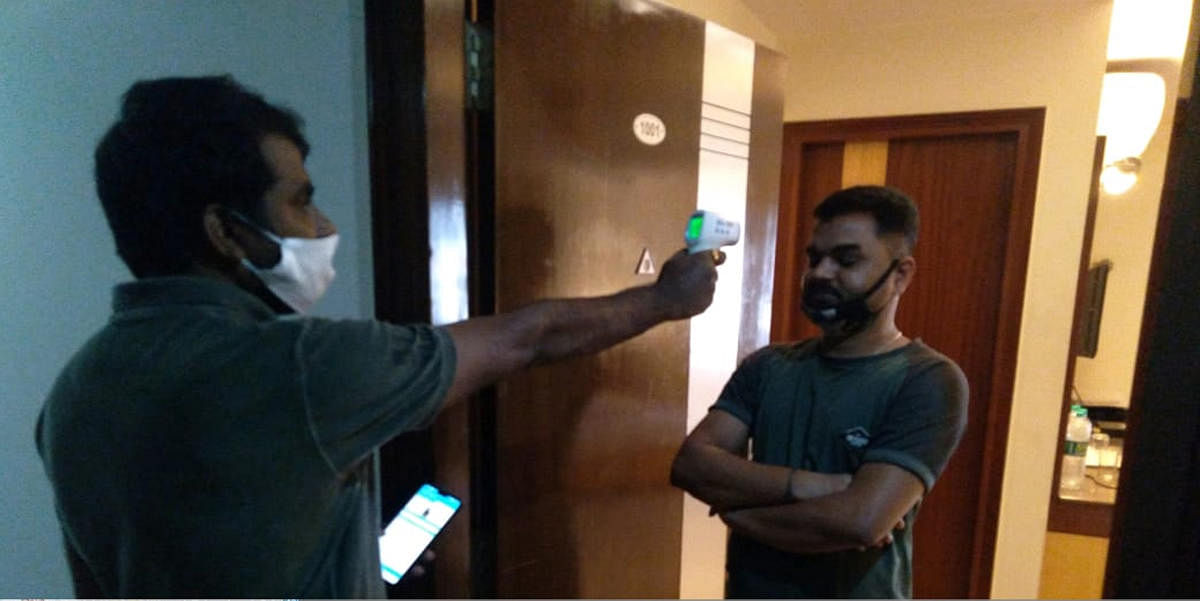
A shocking 5,000 of 50,000 people in home quarantine in Bengaluru step out every day. They go grocery shopping and even take walks alongside regular pedestrians.
According to government data, 10 per cent of all those in home quarantine step out, with no concern for fellow-citizens.
The government is thinking of a crackdown, and could initiate police action against violators.
Home quarantine is the norm for inter-state travellers and contacts of those testing positive, but monitoring is not easy.
Poor compliance
“While people from other cities in the state adhere to the rules and send regular selfies to our app, Bengaluru has only 1 per cent compliance,” says Munish Moudgil, officer in-charge of the state Covid-19 war room.
Home-quarantined people are expected to send selfies with their GPS coordinates on an app called Quarantine Watch.
Punishment threat
The government could soon crack down on quarantine violators by filing FIRs against them. “We believe this will instil some fear and discipline,” says Moudgil.
A senior BBMP official in charge of regulating home quarantine says the Aarogya Setu app helps officials monitor those in quarantine, but the phone is left behind at home to mislead those monitoring those in quarantine.
The BBMP has also formed mobile flying squads. “The moment we spot a violation, our mobile flying squads reach the spot. The first time, we warn the violator. Second-time offenders could have FIRs filed against them,” says the official.
Technology helps, but it is not failproof. “For instance, if a person has left behind his cell phone, we have no way of tracing him. We will then have to depend on his family, neighbours and RWA to give us information,” says Moudgil.
‘Home treatment is the way forward’
Deputy Chief Minister C N Ashwathnarayan says infected people in congested areas could be shifted to institutional quarantine, given the difficulties of home quarantining.
Geo-fencing technology has come in useful to the government, as it tracks movement and triggers a GPS alert when a quarantined person steps out.
“Geo–fencing helps us understand who has visited people in quarantine, and who goes out. This method is cost-effective, simple and does not become a burden,” Ashwathnarayan tells ‘Metrolife’.
Ashwathnarayan believes the virus will mutate and leave. “It could become dormant over time,” he says. Violating home quarantine is a non-cognizable and non-bailable offence but invoking the law is a challenge. Home quarantine and treatment for asymptomatic people is the way forward, he believes.
How people are monitored
Metrolife spoke to two people in home quarantine. This is what their experience is like.
Actor, who didn’t want to be named, back from Mumbai
An actor who returned from Mumbai was put through the paces at the airport, and sent to home quarantine. “Before entering the house, my temperature was checked. When my pulse and other things were fine, they stamped ‘Home-quarantined for 14 days’ on my hand,” he says. In addition to the BBMP, the apartment association monitored his movement. With just two days to go for his home quarantine to end, he thought it was all right to go to the grocery store.
“Just as I stepped out of the house, I got a call from the BBMP saying that I had breached the rules and would be shifted to an institutional quarantine if I did it again. I went straight back in,” he says.
IT professional, back from Delhi
Ranjeet Thakur, a resident of Prestige Ferns on Harlur Road, has completed his home quarantine.
“Those coming from other states to Karnataka have to fill the Seva Sindhu form and inform the resident welfare association and two immediate neighbours in advance. I did as instructed. The RWA was helpful and I got through the 14 days without a hitch,” says Thakur. He also got calls from the BBMP for four days at different times. “Once the official was satisfied with my answers and understood my habits, he told me not to breach the quarantine. I was asked to call the Apthamitra helpline in case I developed a fever or cold,” he says.
Whom to call
- Quarantine breach? Neighbours can call BBMP helpline 1077.
- Covid-19 Apthamitra helpline 14410 works from 8 am to 8 pm.
- Arogya Vani helpline 1070 is run by the state health department.
High Court directive
The High Court recently directed the government to create a grievance redressal cell where people can register complaints against those violating Covid-19 guidelines.
Who’s looking out?
The government has deployed about 20,000 of its employees to visit the houses of the quarantined people at least once in three days. They have to submit a report after each visit.
The Covid-19 war room is trying to rope in volunteers in Bengaluru to enforce quarantining. “About 30,000 have signed up,” says Munish Moudgil, officer in charge of the ‘war room’.